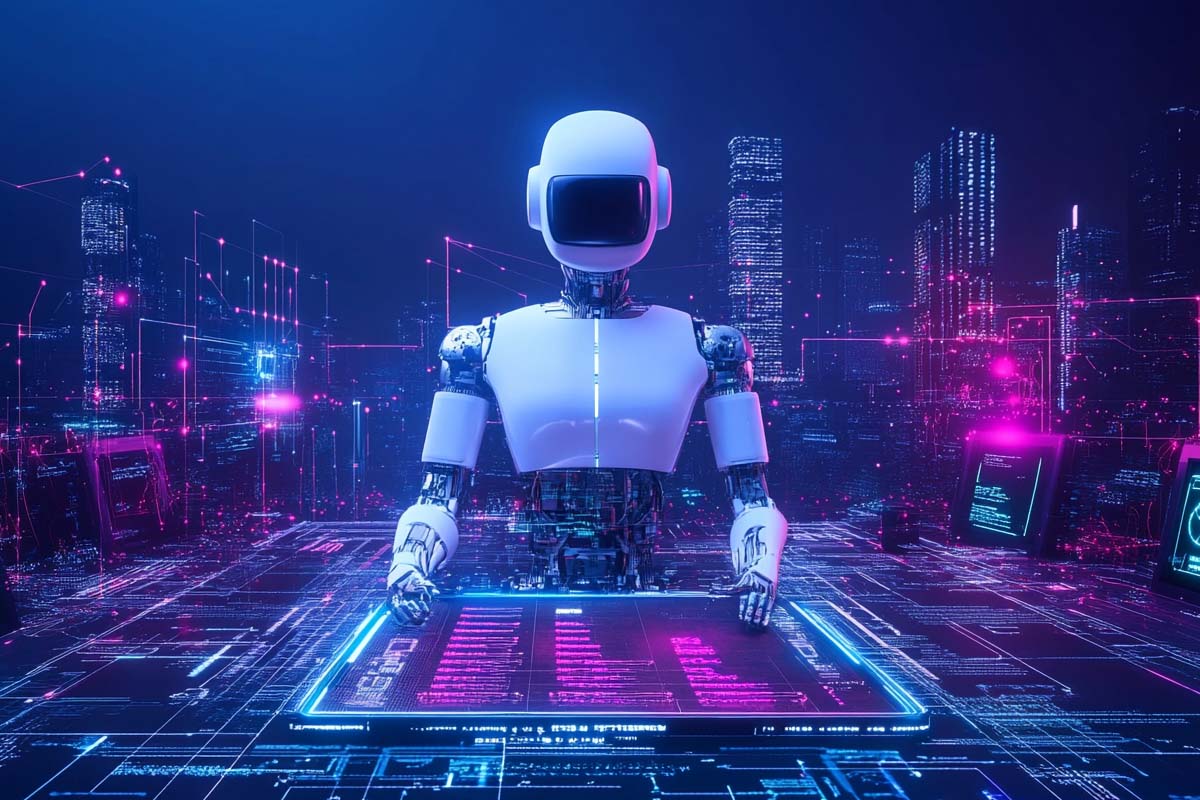Introduction: The AI Revolution Is Here
Artificial Intelligence (AI) is no longer a futuristic concept—it’s transforming workplaces today. From automating repetitive tasks to enabling data-driven decision-making, AI is redefining how we work, collaborate, and innovate. By 2030, experts predict that AI could contribute up to $15.7 trillion to the global economy, but this seismic shift raises critical questions:
- Will AI replace human jobs?
- What skills will be essential in an AI-driven workforce?
- How can businesses and individuals adapt?
This blog explores the future of work with AI, offering insights into trends, challenges, and strategies to thrive in this new era.
1. How AI Is Reshaping Work
AI is augmenting human capabilities rather than outright replacing jobs. Here’s how:
Automation of Routine Tasks
- Example: AI-powered tools like chatbots handle customer service inquiries, while robotic process automation (RPA) streamlines data entry and payroll processing.
- Impact: Freed from repetitive tasks, employees can focus on strategic, creative, and interpersonal work.
Enhanced Decision-Making
- AI analyzes vast datasets to uncover trends, predict outcomes, and optimize workflows.
- Healthcare: AI algorithms diagnose diseases faster than human doctors in some cases.
- Finance: Fraud detection systems flag suspicious transactions in real time.
Hybrid Work Models
- AI tools like virtual assistants (e.g., Microsoft Copilot) and smart scheduling platforms enable seamless remote collaboration.
Statistic:
- By 2025, 70% of enterprises will use AI to augment employee productivity (Gartner).
2. Industries Most Transformed by AI
While AI impacts all sectors, these industries are leading the charge:
Healthcare
- AI Applications: Predictive analytics for patient care, drug discovery, and robotic surgery.
- Job Shift: Demand for AI-savvy clinicians and data analysts will rise.
Manufacturing
- AI Applications: Smart factories use AI for predictive maintenance, quality control, and supply chain optimization.
- Job Shift: Roles in robotics management and AI system oversight will grow.
Customer Service
- AI Applications: Chatbots resolve 80% of routine queries, while human agents handle complex issues.
- Job Shift: Emphasis on empathy, problem-solving, and technical troubleshooting.
3. The Skills of the Future
To stay competitive, workers must develop a blend of technical and soft skills:
Technical Skills
- AI Literacy: Understanding how AI tools work and their limitations.
- Data Analysis: Interpreting AI-generated insights.
- Cybersecurity: Protecting AI systems from vulnerabilities.
Human-Centric Skills
- Creativity: AI can’t replicate original ideas or artistic expression.
- Emotional Intelligence (EQ): Managing teams, resolving conflicts, and building trust.
- Adaptability: Continuously learning as AI evolves.
Statistic:
- The World Economic Forum estimates 50% of employees will need reskilling by 2025 due to AI adoption.
4. Challenges and Ethical Considerations
AI’s rise isn’t without risks:
Job Displacement
- While AI creates new roles (e.g., AI trainers, ethicists), low-skilled jobs in manufacturing, retail, and administration face the highest displacement risk.
Bias and Fairness
- AI systems trained on biased data can perpetuate discrimination in hiring, lending, and law enforcement.
Privacy Concerns
- Workplace surveillance tools (e.g., productivity trackers) raise questions about employee privacy.
Solution:
- Governments and organizations must implement AI ethics frameworks and invest in equitable upskilling programs.
5. The Role of Leadership in an AI-Driven World
Businesses must:
- Reskill Teams: Partner with online training companies for AI training.
- Foster Collaboration: Combine human creativity with AI efficiency (e.g., designers using AI tools like MidJourney).
- Prioritize Transparency: Explain how AI decisions are made to build trust.
Case Study:
- IBM uses AI to match employees with internal projects, boosting retention and engagement.
6. The Rise of the “Human-AI Hybrid Workforce”
The future isn’t humans vs. machines—it’s humans + machines. Examples include:
- Doctors + AI Diagnostics: Faster, more accurate patient care.
- Marketers + AI Analytics: Hyper-personalized campaigns.
- Teachers + AI Tutors: Tailored learning experiences for students.
7. Preparing for the AI Future: Actionable Steps
- For Individuals:
- Upskill via certifications (e.g., Google AI Essentials, CompTIA AI+).
- Cultivate soft skills like critical thinking and collaboration.
- For Employers:
- Invest in AI tools that augment (not replace) workers.
- Create a culture of lifelong learning.
- For Governments:
- Fund AI education initiatives and regulate ethical AI use.
Conclusion: Embrace the AI Opportunity
The future of work with AI is not a dystopian threat—it’s a canvas for innovation. By embracing AI as a collaborator, we can unlock unprecedented productivity, creativity, and human potential. The key lies in adaptability, ethical stewardship, and lifelong learning.
Frequently Asked Questions
Will AI replace human jobs?
AI will transform jobs rather than replace them entirely. While automation may handle repetitive tasks, new roles will emerge that require human creativity, problem-solving, and emotional intelligence. Workers who upskill in AI-related fields will remain competitive in the evolving job market.
Which industries are most affected by AI?
Industries experiencing significant AI transformation include healthcare (AI diagnostics and robotic surgery), manufacturing (predictive maintenance and automation), and customer service (AI chatbots handling inquiries). While AI enhances efficiency, human oversight remains crucial in all sectors.
What skills will be essential in an AI-driven workforce?
Key skills for the future include AI literacy, data analysis, and cybersecurity. Additionally, human-centric skills like creativity, emotional intelligence, and adaptability will be crucial, as AI cannot replicate complex problem-solving or interpersonal connections.
How can businesses adapt to AI-driven changes?
Businesses should invest in AI tools that augment employee productivity, reskill workers through online training programs, and ensure ethical AI implementation. A culture of continuous learning and transparency in AI decision-making will help businesses thrive.
How can individuals prepare for the AI revolution?
Individuals can future-proof their careers by upskilling through AI certifications (e.g., Google AI Essentials), developing soft skills like critical thinking, and staying informed about AI trends. Adapting to new technologies will ensure long-term career resilience.











